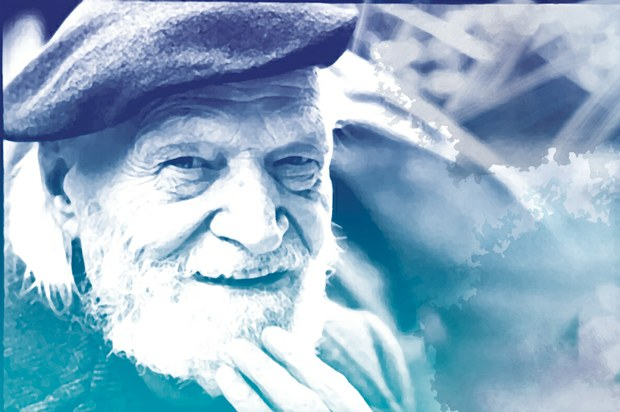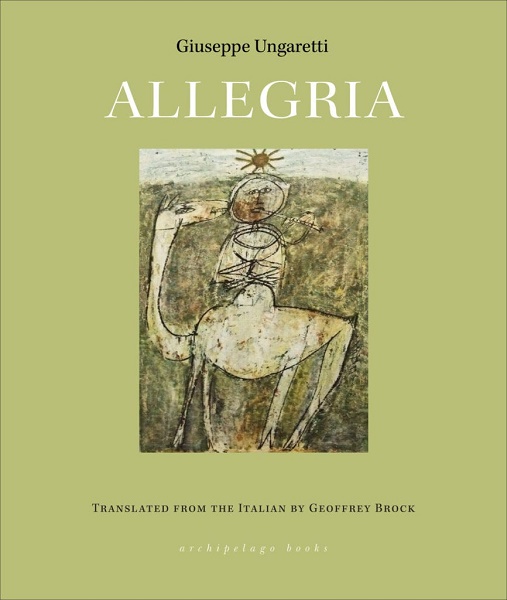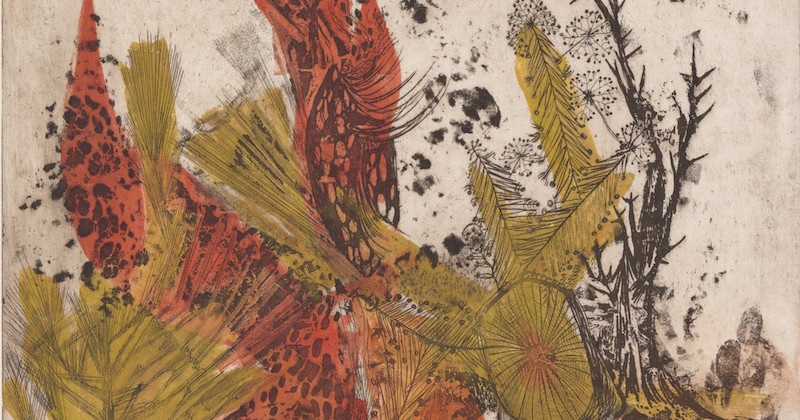ESP
Hijo de italianos, Giuseppe Ungaretti nació el 10 de febrero de 1888 en Alejandría, Egipto, cuando su padre trabajaba en la construcción del Canal de Suez. De Egipto, donde se formó inicialmente, pasó a Francia en 1912. En París realizará sus estudios universitarios y entrará en contacto con escritores y artistas de la naciente vanguardia, como Apollinaire y Picasso, entre otros. A raíz de la Primera Guerra Mundial se va a Italia y se enrola en el ejército. De su experiencia en la guerra saldrán sus primeros libros. Ejerció como corresponsal de algunos periódicos, lo que le permitió viajar a muchos países (Holanda, Argentina, Brasil, etc.), así como la docencia universitaria en Brasil e Italia, donde se instaló a partir de la Segunda Guerra Mundial, teniendo una polémica afinidad con el fascismo italiano, del que luego se alejaría. Falleció en Milán el 1 de junio de 1970.
ENG
The son of Italians, Giuseppe Ungaretti was born on February 10, 1888 in Alexandria, Egypt, when his father worked on the construction of the Suez Canal. From Egypt, where he was initially trained, he moved to France in 1912. In Paris he studied at university and came into contact with writers and artists of the nascent avant-garde, such as Apollinaire and Picasso, among others. After the First World War he went to Italy and enlisted in the army. His first books came out of his war experience. He worked as a correspondent for some newspapers, which allowed him to travel to many countries (Holland, Argentina, Brazil, etc.), as well as university teaching in Brazil and Italy, where he settled after World War II, having a controversial affinity with Italian fascism, from which he would later move away. He died in Milan on June 1, 1970.

Escribió alrededor de doce libros de poemas, que fueran recogidos finalmente en Vida de un hombre, editada originalmente en varios volúmenes desde 1942 hasta 1962, entre ellos: La alegría (1914-1919), Sentimiento del tiempo (1919-1935), El dolor (1937-1946), La tierra prometida, El desierto y después (1931-1946).
La poesía escrita por Ungaretti es de las más relevantes de la literatura italiana y universal, por su carácter renovador, de un lado, pero también por su revaloración de la poesía clásica. Junto con Montale y Quasimodo, se le considera el representante de la escuela hermética de la poesía italiana (sobre la poesía de los dos anteriores publiqué aquí los posts 1 y 2).
El aporte fundamental, renovador, de la poesía de Ungaretti se concentra en su modo de abordar la palabra en su poesía. Tendrá, en primer lugar, un carácter esencial y directo, despojada de retórica, de tono cotidiano y común. Y luego, el modo de trabajar la sintaxis (ordenación) y la disposición en el cuerpo del poema, alejado de la métrica y la rima, especialmente en sus primeros libros. Así lo podrán observar y apreciar en los poemas suyos que reproduciré seguidamente.
Son poemas de su libro La alegría, una especie de diario, que inicialmente se iba a llamar Alegría de naufragios, que he tomado de la edición publicada en Caracas (como verán en las referencias).
He wrote about twelve books of poems, which were finally collected in Life of a man, originally published in several volumes from 1942 to 1962, among them: The Joy (1914-1919), Feeling of Time (1919-1935), The Pain (1937-1946), The Promised Land, The Desert and After (1931-1946).
The poetry written by Ungaretti is among the most relevant of Italian and universal literature, on the one hand for its renewing character, but also for its revaluation of classical poetry. Together with Montale and Quasimodo, he is considered the representative of the hermetic school of Italian poetry (on the poetry of the two previous ones I published here the posts 1 and 2).
The fundamental, renovating contribution of Ungaretti's poetry is concentrated in his way of approaching the word in his poetry. It will have, in the first place, an essential and direct character, stripped of rhetoric, with an everyday and common tone. And then, the way of working the syntax (arrangement) and the disposition in the body of the poem, far from metrics and rhyme, especially in his first books. This can be seen and appreciated in the poems of his that I will reproduce below.
They are poems from his book The Joy, a sort of diary, which initially was to be called Castaway joy, which I have taken from the edition published in Caracas (as you will see in the references).

Mi casa
Sorpresa
después de tanto tiempo
un amorCreí haberlo derramado
por el mundo
My home
Surprise
after so long
a loveI thought I had spilled it
all over the world
Noche de mayo
El cielo pone en las cimas
de los minaretes
guirnaldas de luces
May night
The sky puts on the tops
of the minarets
garlands of lights
Silencio
(Mariano, 27 de junio 1916)
Conozco una ciudad
que cada día se inunda de sol
y todo se extasía en ese momentoMe fui de allí una noche
En el corazón persistía el rumor
de las chicharrasDesde el bote
barnizado de blanco
vi
desaparecer mi ciudad
dejando
poco a poco
un cúmulo de luces en el aire turbio
suspendidas
Silence
I know a city
that every day is flooded with sunshine
and everything is enraptured in that momentI left there one night
In my heart lingered the murmur
of the cicadasFrom the boat
varnished in white
I saw
my city disappear
leaving
little by little
an accumulation of lights in the murky air
suspended

San Martín del Carso
(Valloncello dell' Albero Isolato a 27 agosto de 1916)
De estas casas
no ha quedado más
que algún pedazo
de muroDe tantos
a quienes estaba unido
no ha quedado
ni siquiera esoPero en el corazón
ninguna cruz faltaMi corazón
es el país más devastado.
San Martin del Carso
Of these houses
only a few pieces
than a piece of wall
of wallOf so many
to whom it was attached
has not remained
not even thatBut in the heart
no cross is missingMy heart
is the most devastated country.
Vagabundo
(Campo di Mailly 1918)
En ningún
pedazo
de tierra
puedo
arraigarEn cada
nuevo
clima
que encuentro
me entristece
que
alguna vez
ya había estado allí
habituadoY me distancio siempre
extranjeroNaciendo
regresando de épocas muy
vividasGozar un solo
minuto de vida
inicialBusco un país
inocente
Wanderer
In no
piece
of land
can I
take rootIn every
new
climate
I encounter
it saddens me
that
I had once
I had already been there
accustomedAnd I always distance myself
foreignerBorn
returning from times long
livedEnjoying a single
minute of life
initialI am looking for a country
innocent
La noche bella
(Devetachi, 24 de agosto 1916)
Qué canto se ha elevado esta noche
que enlaza
con eco cristalino del corazón
las estrellasQué fiesta surgía
como de corazón que va a casarseHe sido
un pozo de tinieblaAhora muerdo
como un niño el pecho de su madre
el espacioAhora estoy ebrio
de universo
The beautiful night
What a song has risen tonight
that links
with crystalline echo of the heart
the starsWhat a party arose
as from a heart that is about to marryI have been
a well of darknessNow I bite
like a child at its mother's breast
spaceNow I am drunk
of the universo
Creo que pueden apreciar en estos poemas los rasgos arriba indicados, sin que yo tenga que detenerme en ellos. Solo quisiera agregar que quizás en la esencialidad y naturalidad de la palabra poética de Ungaretti pervivan la presencia del desierto egipcio con lo agreste del campo paterno. Finalmente, si bien su poesía está tocada por el dolor y la destrucción, el poeta llegó a declarar su "voluntad de vivir, a pesar de todo, a pesar del tiempo, a pesar de la muerte".
I think you can appreciate in these poems the features indicated above, without my having to dwell on them. I would only like to add that perhaps in the essentiality and naturalness of Ungaretti's poetic word, the presence of the Egyptian desert and the wildness of the paternal countryside are still present. Finally, although his poetry is touched by pain and destruction, the poet went so far as to declare his "will to live, in spite of everything, in spite of time, in spite of death".
Referencias | References:
Ungaretti, Giuseppe (1996). La Alegría (Traduc.: Carmen Leonor Ferro). Caracas: Museo Jacobo Borges.
https://es.wikipedia.org/wiki/Giuseppe_Ungaretti
https://en.wikipedia.org/wiki/Giuseppe_Ungaretti
http://amediavoz.com/ungaretti.htm





